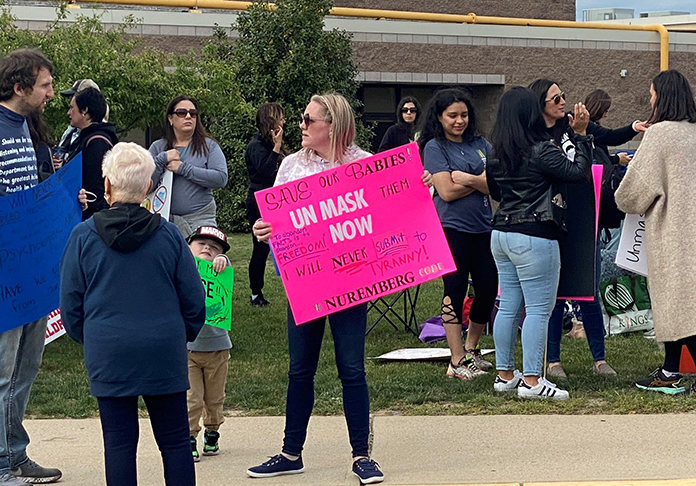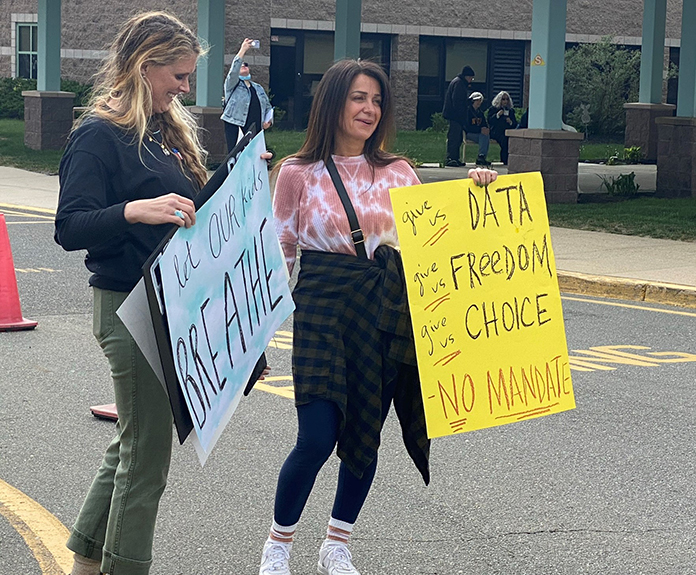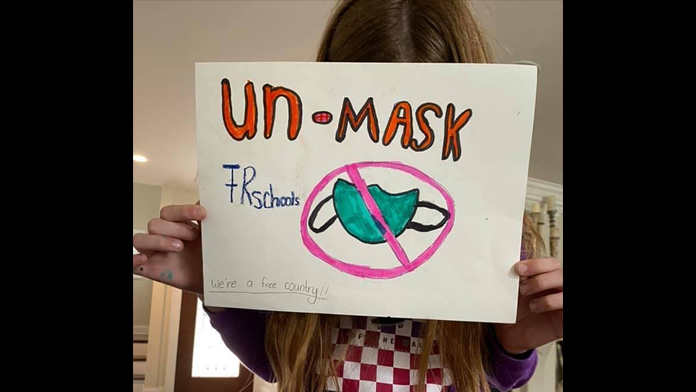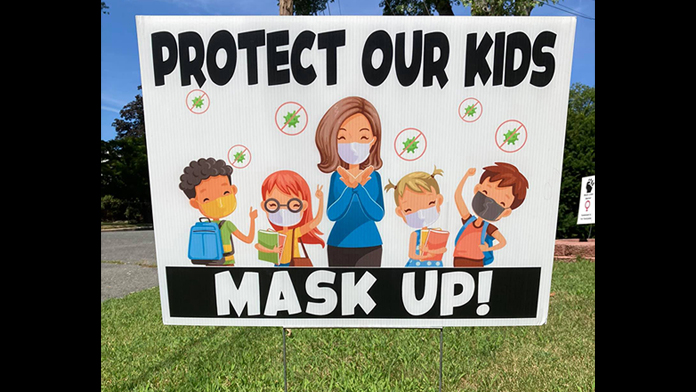
NEW JERSEY – A United States District Court judge has declined a request for emergent relief that would have at least temporarily made mask-wearing optional in New Jersey schools.
After explaining his rationale for deciding not to issue the temporary restraining order (TRO), Judge Kevin McNulty said the next step was to consider a preliminary injunction.
The judge delivered his ruling in conjunction with a class action lawsuit and Order to Show Cause brought by Princeton attorney Bruce Afran. While the legal papers requested permanent removal of the mask-wearing mandate, Afran asked the court to temporarily stay the provisions of two Executive Orders that include conditions requiring children to wear masks to school.
Under New Jersey and federal laws, TROs act as short-term solutions used to protect parties against immediate harm. McNulty could issue a preliminary injunction in this matter if plaintiffs demonstrate students are likely to suffer irreparable harm if forced to wear masks.
The lawsuit filed in federal court alleges Governor Phil Murphy and the other defendants violated the First, Fifth, and 14th Amendments in issuing the mask mandates solely against schoolchildren.
During oral argument before McNulty, Afran acknowledged the law allows the state to create educational programs and also takes care of children during the day. He cited the term “in locos parentis” to refer to the school’s responsibility to act instead of the parent when they are in school.
“We don’t allow a child to beat up another child,” said Afran by way of example. “…But the local in parentis role, does not allow the state to smother and suppress basic rights.”

According to Afran, the state did not demonstrate that masks are “uniquely necessary for a child’s health” compared to everyone else. (The Executive Orders do not distinguish between children and adults in calling for mask mandates in schools.)
Afran pointed out the Executive Orders reference the fact that children under 12 cannot be vaccinated but made no reference to any specific metrics or “upticks” that would identify kids as a specific risk group. He then estimated that approximately 40 percent of New Jersey’s population remains unvaccinated.
“The governor is permitting literally millions of adults who are unvaccinated to mix in public with each other,” said Afran. “…Everyone is literally allowed to be packed together, and there’s no regulation from the government.”
Speaking on behalf of his clients, Afran suggested the inconsistencies represented discrimination under the Equal Protection Act.
The state’s brief in opposition to Afran’s arguments explains policymakers took guidance from both the Center for Disease Control and Prevention (“CDC”) and the American Academy of Pediatrics (“AAP”).
“…Given that students remain largely unvaccinated, school settings – which congregate large numbers of individuals indoors for extended periods of time – present heightened risks,” wrote Assistant Attorney General Daniel M. Vannella.
The state emphasized that the focus was on bringing back in-person learning in the safest way possible. Officials made the decision to require all individuals to wear masks throughout the day “bolstered by conclusions from the CDC, AAP, and New Jersey Department of Health, (that) demonstrate conclusively that universal masking reduces the spread of this virus and can save the lives of schoolchildren and their families.”
In his ruling, McNulty found the state could reasonably rely on the referenced entities to make their mandate. Accordingly, the plaintiff’s case did not meet the entitlement to emergent relief based on the equal protection argument.
Afran also argued that the mask requirements burden and impair students’ protected rights of association, privacy, and speech under the First Amendment. He provided the court with written declarations in support of his claims that their fundamental rights were violated.
“Plaintiffs and teachers have testified as to the almost complete disappearance of children’s speech and association under the masking orders,” Afran wrote in papers he submitted to the court.
Rhiannon Mindas, a Lacey Township fifth and sixth-grade teacher, first described the impact of overall COVID-19 restrictions last year before detailing the changes she saw when masks became optional in her district last June.
“At this time, the kids began to socialize with each other and began to criticize one another, to be sarcastic as ten-year-olds will do,” declared Mindas. “Until this time, the children had no opportunity to socialize and act out in a normal way for this age group.”
A 17-year-old Barnegat High School student referred to as M.F. shared his difficulties with wearing the mask as he has extreme difficulties in communicating without being able to see faces and emotions as he has Asperger’s Syndrome.
According to the Declaration of M.F., he has epilepsy and said most of his seizures were brought about by high temperatures and heat. When he did wear a mask in a supermarket, M.F. immediately felt fatigued, had difficulty breathing and a heat buildup. He related to these types of circumstances as leading to his seizures.
Afran alleged that the entirety of children’s daytime lives is burdened as a result of the masks for anywhere from 6-8 hours.
These are “the very times when children are most in a position to have ‘personal intercommunication’ and associate with people outside of their families,” Afran wrote.

The judge reviewed case law presented by the attorneys regarding whether the masks place restrictions of any kind on speech.
“The mask rule is not aimed at expressive conduct,” said McNulty. “It is clearly a response to the infection rates, which are rising.”
McNulty acknowledged that the masks impair communication and make students unhappy, which can make them clam up. However, he concluded that the impact of masks on communication thus far was not persuasive enough to justify emergent relief.
The federal class action lawsuit does not address the efficacy of masks or whether their use represents health hazards. Additionally, plaintiffs have not provided the court with documentation from a medical expert that would support this type of claim.
As part of its submittal to the court, the state submitted the declaration of Edward Lifshitz, MD the Medical Director of the Infectious and Zoonotic Disease Program, Communicable Disease Service, New Jersey Department of Health.
“Masks thus work through a combination of source control (preventing the spread of infectious droplets and aerosols from someone who is contagious) and protection for the mask wearer,” declared Lifshitz. “Although some types of masks are more effective in blocking droplets than others, any covering does a better job than none at all.”
Lifshitz provided the court with the names of studies that documented his opinion. He also quoted CDC Director Dr. Robert Redfield’s statement that “face coverings are one of the most powerful weapons we have to slow and stop the spread of the virus – particularly when used universally within a community setting.”

When she worked as a school nurse for Stafford Township schools, Erin Pein termed the masks ineffective and showed up at work maskless. The district suspended Pein for her actions and did not renew her contract. Hundreds showed up to rally in support of Pein’s decision.
No date has been set for consideration of the preliminary injunction. When offered the opportunity to depose witnesses, Afran initially said he might want to take the deposition of Dr. Lifshitz. In the interest of time, the attorney may forego depositions.
“While I did not consider this TRO material,” concluded the judge. “I am keeping an open mind.”
Kelly Ford, a Barnegat parent, expanded her fight against school mask requirements as the 2020-2021 school year ended. She has a website set up and a Facebook page entitled Class Action Suit Free NJ Kids with nearly 4,400 followers.
A Gofundme page set up by Ford has already collected over $63,000 targeted for the “Free NJ Kids Legal Fund.”






